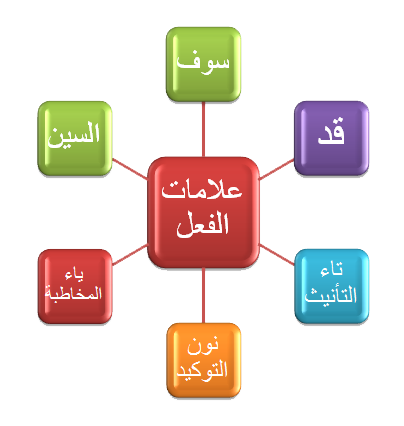Verb Determiners in Arabic Posted by Fisal on Mar 2, 2016 in Arabic Language, Grammar, Pronunciation, Vocabulary
- Ahlan أهــْــلاً , Arabic lovers! In the post Basics of Arabic Grammar, we learnt that Arabic parts of speech are mainly; a noun, a verb or a particle. But how can we differentiate between these parts of speech?
- In a previous post, we learnt about the Noun Determiners and I am sure that all of you now can determine or decide whether a word is a noun or not. Today, we are going to learn how to do the same with verbs.
- You can refresh your mind about nouns by reviewing the post; Introduction to Verbs.
- For detailed study of Arabic verbs, kindly refer to our Index of Arabic Grammar.
Definition:
A verb determiner is a marker or a suffix that comes at the end of a verb to distinguish it from other parts of speech. Any word that accepts one or more of these markers or determiners is no doubt a verb.
Verb Determiners (Markers) عــَــلامــَــاتُ الــفــعــل:
There are four determiners or markers to distinguish Arabic verbs. If a word accepts one or more of these determiners, then the word is a verb:
1- The Taa of the Subject (تــاءُ الــفــاعــل): In Arabic grammar, the suffix Taa (ت) when attached to past tense verbs is called the Taa of the Subject تــاءُ الــفــاعــل because it substitutes the subject. This Taa is a kind of the pronouns that comes attached and visible at the end of the verb. Revise Arabic Pronouns II.
Ex. كــَــتــَــبــْــتُ الــدَّرسَ. = I wrote the lesson.
Ex.هــَــل كــَــتــَــبــْــتَ الــدّرسَ؟ = Did you (male) write the lesson?
Ex.هــَــل كــَــتــَــبــْــتِ الــدّرسَ؟ = Did you (female) write the lesson?
In the above Arabic examples, we do not need to mention the subject pronouns I أنا or You (male) أنتَ or You (female) أنتِ because we replaced it with the Taa of the Subject that is attached to the end of the verb…etc. This Taa pronoun has a Haraka (Fat’ha, Damma or Kas’rah) on it; Arabic Diacritics.
2- The Consonant Feminine Taa (تــاءُ الــتــأنــيــثِ الــســَّــاكـِـــنــَــة): This Taa (تْ) is different. It has a Su’koun on it and refers to a feminine subject. It comes at the end of the feminine past tense verbs, too.
Ex. كــَــتــَــبــَـــتْ (هى) الــدَّرسَ. = She wrote the lesson.
Ex.الــمــرأةُ نــَــالــَــتْ (هى) حــُــقــُــوقــَــهــا. = The woman (she) obtained her rights.
In Arabic sentence analysis, we just say that the Taa is the Feminine Taa and the subject is (often) the invisible (implicit) pronoun (she).
3- The Yaa of Address (يــَــاءُ الــمــُــخــَــاطــَــبــَــة): In imperatives, we have no problem addressing males. However, to address a female with an imperative, you must use this Yaa suffix at the end of the verb and it is called the Yaa (ى) of Address. This Yaa is also used with present tense verbs; (Revise Arabic Pronouns II).
Ex. اُكــْــتــُــبــِــى الــدَّرسَ. = (You; female) write the lesson. (Imperative)
Ex. يــَــجــبُ أنْ تــَــكــْــتــُــبــِــيــن. = (You; female) should write. (Present Tense)
4- The Affirmative Nuun (نــونُ الــتــوكــيــد): This suffix is a Nuun (نّ) with a Shaddah on it and that comes at the end of future tense verbs or verbs used to give an oath for the purpose of affirmation or confirmation and shows that you are serious. It can be used by either males or females.
Ex. لأكــْــتــُــبــَــنَّ روايةً. = I will (definitely) write a novel.
Ex. اِصــْــبــِــرَنَّ. = Be patient!
To sum up, if a word accepts one or more of the above determiners, then this word is a verb.
*****
Find all our grammar posts here; Index of Arabic Grammar.
*****
Check us back Soon!
Peace ســَــلام /Salam/

Build vocabulary, practice pronunciation, and more with Transparent Language Online. Available anytime, anywhere, on any device.
About the Author: Fisal
Well, I was born near the city of Rasheed or Rosetta, Egypt. Yes, the city where the Rosetta Stone was discovered. It is a small city on the north of Egypt where the Nile meets the Mediterranean. I am a Teacher of EFL.





Comments:
Abdul Mujeeb:
Assalamualykum Br. Fisal,
Mashallah may Allah give u jaza e khair for your efforts.
But i have a doubt, if i follow all the posts here seriously, do u think i can start speaking arabic???
Fisal:
@Abdul Mujeeb Sure, you can if you practice! Youtube videos can help you greatly 🙂
Jody Gosch:
I have come across the word “ASHADATU” and would like it translated into American English. Any assistance would be greatly appreciated. Thanks in advance!
Fisal:
@Jody Gosch Hi Jody. This is a diacritic mark that is put on top of some Arabic letter to mark stress or a doubled letter. Kindly, check these post:
1) https://blogs.transparent.com/arabic/1-arabic-diacritics-al-tashkeel-%D8%A7%D9%84%D9%80%D8%AA%D9%80%D8%B4%D9%80%D9%83%D9%80%D9%8A%D9%80%D9%80%D9%80%D9%84/
2) https://blogs.transparent.com/arabic/2-arabic-diacritics-al-tashkeel-%D8%A7%D9%84%D9%80%D8%AA%D9%80%D8%B4%D9%80%D9%83%D9%80%D9%8A%D9%80%D9%80%D9%80%D9%84/